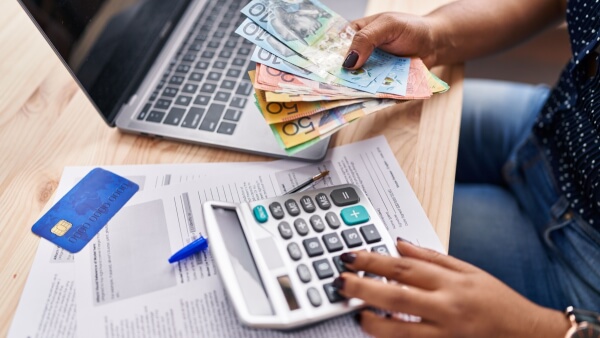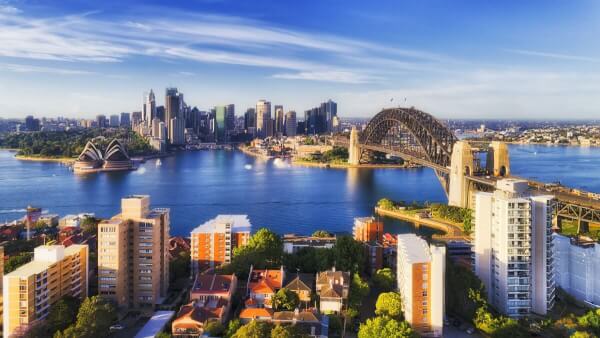Inheritance tax in Australia: What you need to know
Discover everything you need to know about inheritance tax in Australia, including whether it exists in the country and other related taxes.

Dreaming of a new life Down Under? Australia has lots to offer British newcomers, including a shared language and culture, sunny weather and friendly people. In this guide, we’ll cover everything you need to know about moving to Australia from the UK. This includes visas, cost of living, finding a place to live and much more.
We’ll also point out a cost-effective way to manage your money across borders from Wise. Open a Wise account and you can send money between the UK and Australia for low fees* and at the mid-market exchange rate.
Learn more about the Wise account
Want to take your savings with you? Wise can also help you with large transfers. Simply email our expert team or request a call back below.
Yes, you can move to Australia from the UK, but the process might be tricky. Australia’s immigration policy is notoriously strict and operates on a points-based system, which can make a permanent move there quite difficult.1
However, it’s far from impossible, especially if you have family connections to Australia, are a skilled worker or have an Australian employer sponsoring you to come over and work.
But before all of this, you’ll need a visa to even visit Australia. The most common types of electronic visitor visas are the eVisitor visa and the Electronic Travel Authority (ETA).2

Nothing has changed post-Brexit for Brits moving to Australia since it only affected EU relationships. While the process can still be challenging, speaking the same language as Australians makes it easier for UK expats to settle in, find jobs and meet new people.
There are a few potential routes into Australia for British citizens. These include:
📚 Australia Skills in Demand visa
Getting a visa for Australia isn’t easy or quick, and there’s likely to be a lot of paperwork required. In addition to the main visa categories, there are several others available, so be sure to research them all.
The best way to move to Australia depends on your plans once you arrive and there are plenty of visas available. If you intend to work, your best option is to find an employer willing to sponsor your visa.
For example, one of the possible options is the Skills in demand visa (SID), created to help meet Australia's skills needs. This visa might lead to permanent residency.4
The easiest way to get to Australia from the UK is by plane. The cheapest month to do so is May, and it’ll cost you around £294 one-way.5
However, you won’t always find such a good deal and if you do, it will probably be limited. A one-way ticket to Australia can sometimes exceed £2,000, so the average price is around £700-£800.6
Wise can help you save money on travel costs, especially if you’re paying in a foreign currency. With the mid-market exchange rate and no foreign transaction fees, you’ll be able to make the most out of your money. The Wise card can be used for everything from everyday shopping to buying flight tickets for Australia.
The cheapest way to transport your belongings to Australia is by sea freight, but it can be slow. To speed up the process, consider using air freight alongside sea freight or shipping everything by plane.7
Here are some companies you could consult for transporting your things:
Wise can be very useful when paying for a moving company. It allows you to send, receive and spend in both British pounds and Australian dollars. With transparent, low fees and transactions at the mid-market exchange rate, you get the best value for your money.
Here are some basic facts you should know about Australia if you’re considering moving there:
| 💰 Currency: | Australian dollar (AUD) |
|---|---|
| 🗣️ Main language: | English |
| 👥 Population: | 26,892,8808 |
| 🇬🇧 Number of British expats: | around 1.1 million9 |
| 🧭 Popular expat destinations: | Sydney, Brisbane, Melbourne, Gold Coast |
In general, the cost of living in Australia is about the same as in the UK, except for a few aspects. For example, groceries are 20% more expensive, while utilities tend to be cheaper.10
Let’s take a look at a few average prices for common spending categories in Australia, compared with the UK:
Opening an Australian bank account will make life easier as a new arrival, especially when it comes to paying rent and covering everyday expenses. And if you get a job or expect to receive income from elsewhere, a bank account will be essential for paying in your earnings.
The good news for British expats is that it’s reasonably straightforward to open an Australian bank account as a non-citizen. Some major banks in Australia, such as CommBank, may even let you open your account online while you’re still based in the UK.
CommBank allows you to start your application 14 days before arriving in Australia. You'll need to fill out the application form and provide your entry visa details. Once in Australia, you must visit a branch with your ID within 20 days of opening your account.11
It’s a good idea to contact the bank in advance to ask which documents you’ll need. And whether you’ll be able to keep your UK bank account after moving depends on your bank. For example, Barclays closes your account once you move abroad.12
📚 Opening a bank account in Australia
And, as an alternative to a bank account, check out the Wise account. You can use it to send, receive and spend in multiple currencies, including British pounds and Australian dollars. Opening the account is pretty straightforward and you can open it before you even leave the UK.
If you’re entering Australia on a work-stream permanent residence visa, you may already have a job with a sponsoring employer lined up. If not, your main option is looking for a job online.
You can potentially start job hunting even before you leave the UK. Here are some good places to start your search:
If you want to open a business, some visas require you to live in Australia for at least 12 months, along with meeting other criteria. For example, the Business Owner visa is only available to holders of provisional subclass 160, 161, 162, 163, 164, or 165 visas.13
Since there are many work visa options, be sure to research and find the one that matches your specific situation.

It could be a good idea to make a few trips out to Australia to get a feel for your chosen city or region, and to scout out places to rent or buy. But to start your search in the UK, here are some handy websites to explore:
You can buy property in Australia as a non-citizen, but there are certain rules and restrictions you’ll need to follow. For example, if you don’t have a permanent visa yet, you’ll need to get approval from the Foreign Investment Review Board (FIRB). Your application should include personal details, property information and the purpose of purchase.14
📚 Buying property in Australia
Non-residents can only buy new dwellings, before or after construction is finalised. You might also need a higher deposit when applying for a mortgage and you can only get it from a limited number of lenders.14
When it comes to Foreign Citizen Stamp Duty, foreign nationals will pay more than the standard. However, the rate varies by State and Territory.14
Given the high costs involved when it comes to renting or buying and financing abroad, it makes sense to find a provider with low fees* and transparent pricing. Wise may save you money, especially on currency conversion fees on larger amounts. Our dedicated team of experts can help assist you with every step of your transfer. Simply email us or request a call back below.
The Australian healthcare system is known to be efficient and excellent. The public universal healthcare system, Medicare, provides free or reduced doctor’s appointments, medicines and essential hospital treatment. You can access it as a UK citizen on a visit to Australia, due to the UK and Australia having a reciprocal healthcare agreement in place.15
If you move to Australia, you’ll need to start paying income tax to access the system as a permanent resident. This is how Medicare is funded, through a special tax levy. However, many Australians also have private health insurance too, using it in combination with the public healthcare service.15
Taking out a policy could be a good idea as a newcomer, as many services and medicines aren’t free, such as dentistry. It’s good to know you and your family are fully covered from the moment you arrive, so there aren’t any unexpected medical bills to worry about.15
📚 Private healthcare in Australia

Here’s what you should know when moving to Australia with a family:
Australia has some of the best schools in the world. Primary and secondary school are compulsory, while the complete school education lasts 13 years.16
When it comes to universities, the highest-ranked ones are the University of Melbourne, the University of Sydney, the University of New South Wales and the Australian National University.17
The cost of healthcare for you and your baby will depend on the type of visa you’re on, as well as the kind of health insurance you have. However, you’ll be able to access care before, during and after pregnancy.18
If the parents are on a visa when their baby is born, the baby will receive the same visa. This means the baby won’t automatically become an Australian citizen by birth.18
Cats and dogs must be microchipped, vaccinated against rabies and tested before travel. Owners must apply for an import permit at least 42 days in advance, book quarantine accommodation and complete required health checks and parasite treatments.19
When you arrive in Australia, your pets will be taken to a government quarantine facility for at least 10 days.19

Australia is a popular destination for UK retirees, but just how easy is it to get a visa and retire in Australia? Let’s go through your options.
You can potentially apply under one of the permanent residence visa categories, especially if you have family connections in Australia. However, the other option is to go through the retirement visa pathway to permanent residency.20
The eligibility criteria for this is quite narrow though, as you need to have previously held an Australian retirement visa or investment retirement visa. However, you can also access the pathway by applying for a parent or contributory parent visa.20
📚 Retire to Australia from the UK
If you manage to retire in Australia, you can also claim your UK state pension there. It can be paid into a UK bank account or an Australian one, in which case you’ll be paid in the local currency. You can choose how often you’ll get paid - anywhere from 4 to 13 weeks. Contact the International Pension Centre to get the most recent information.21
📚 Transferring UK pension to Australia
Let’s go through the most important steps of moving to Australia from the UK:
Before moving to a new country, you’re likely to have lots of costs to cover. Some of these, such as real estate costs, visa application fees and rental deposits, will need to cross borders.
Open a Wise account and you can send money between the UK and Australia for low, transparent fees* and the mid-market exchange rate. It’s not a bank account but offers many similar features.
You can also use Wise once you arrive in your new home. You can spend in AUD from the moment you step off the plane using your Wise card. It works in @{150+ countries and automatically converts your pounds to the local currency, only adding a tiny, upfront currency conversion fee*.
Remember, if you’re moving to Australia or anywhere else in the world, Wise can help with sending or receiving large amounts, our dedicated team of experts are ready to help with every step of your transfer. Simply email us or request a call back below.
Sources used:
1. CJ Migration - points system explained
2. Gov.uk - entry requirements
3. Homeaffairs.gov.au - permanent residence visas
4. Study Australia - skilled worker visa
5. Skyscanner - London to Australia
6. Skyscanner - London to Perth flights
7. PSS Removals - shipping to Australia
8. Worldometers - Australia population stats
9. Homeaffairs.gov.au – UK population stats
10. Numbeo - cost of living in Australia compared to the UK
11. CommBank - migrant banking
12. Barclays - living outside the UK
13. Homeaffairs.gov.au - work visas
14. NerdWallet - foreigners buying property
15. MoveHub - healthcare for expats
16. Study Australia - schools
17. Top Universities - study in Australia
18. Pregnancy, Birth and Baby - pregnancy care on a visa
19. Pets Abroad - importing pets to Australia
20. Homeaffairs.gov.au - retirement visa pathway
21. Gov.uk - State Pension if you retire abroad
Source last checked on: 17th March 2025
*Please see terms of use and product availability for your region or visit Wise fees and pricing for the most up to date pricing and fee information.
This publication is provided for general information purposes and does not constitute legal, tax or other professional advice from Wise Payments Limited or its subsidiaries and its affiliates, and it is not intended as a substitute for obtaining advice from a financial advisor or any other professional.
We make no representations, warranties or guarantees, whether expressed or implied, that the content in the publication is accurate, complete or up to date.

Discover everything you need to know about inheritance tax in Australia, including whether it exists in the country and other related taxes.

Find out how much does it cost to have a baby in Australia, including hospital fees, health insurance and other expenses.

Read our complete guide to the Australia digital nomad visa, covering fees, documents, eligibility requirements and application process for 2025.

Discover the pros and cons of living in Australia vs the UK in our handy guide, including tips on where to live in Australia and safety advice.

Find out how income tax in Australia works for foreigners in our handy guide for UK expats, overseas workers and digital nomads.

Can I keep my Australian bank account if I move abroad? Find out everything you need to know here in our handy guide.